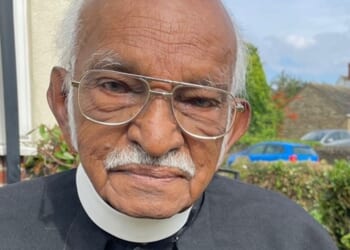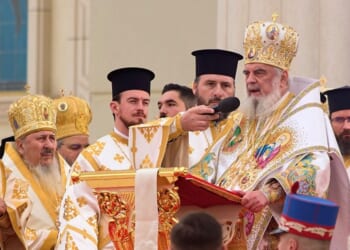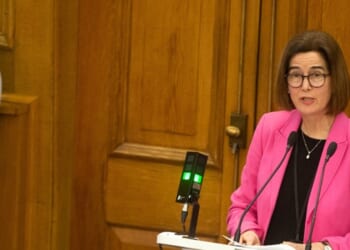
WASHINGTON — The recent arrests of senior church leaders in the world’s first Christian nation are effectively silencing clergy from one of the world’s oldest churches and could hinder Armenia’s growing relationship with the United States, human rights experts warned in a bid to raise the awareness of lawmakers on Capitol Hill.
More than three months after a peace agreement between Armenia and Azerbaijan was signed at the White House, legal experts and representatives from Christian advocacy organizations spoke during a briefing last Thursday sponsored by the National Democratic Alliance, which classifies itself as an Armenian pro-Western, center-right political party.
Tensions between Prime Minister Nikol Pashinyan and leaders of the Armenian Apostolic Church, an ecclesiastical body dating back to 301 A.D. with ties to the Apostles Bartholomew and Thaddeus, have escalated this year over the arrest of at least three senior clergy on coup-related charges and other Pashinyan critics, including billionaire Samvel Karapetian.
Advocates say the arrests that began in the spring and continued over the summer and into the fall are unjustified and represent a crackdown on leaders within the Apostolic Church who have emerged as opponents of Pashinyan in the aftermath of Azerbaijan’s 2023 invasion of Nagorno-Karabakh, which displaced over 120,000 Armenians from the region.
Constitutionally independent from the state, the Armenian Apostolic Church leaders have strongly objected to Armenian land concessions amid war with neighboring Azerbaijan. In return, Pashinyan hasn’t minced words in his criticisms of church leadership, accusing the head of the church, Catholicos Karekin II, of breaking his celibacy vow by having a child.
Pashinyan has even called for the Catholicos’ resignation and the election of a new Catholicos, saying he would launch a “Coordinating Group” to oversee the new election. Such an intrusion into church affairs by the country’s civil leader would violate the Armenian Constitution and church bylaws, the speakers said.
“Pashinyan has gone on record in a press conference recently in November to say that the church has no Catholicos, accusing the Catholicos of illegitimately occupying his position,” United Kingdom-based international legal scholar Peter Flew said.
“At the same time, he’s arrested the brother and nephew of Catholicos, again, using another part of the criminal code that’s rarely used. But I’m especially concerned by Pashinyan’s statement about the spiritual and moral renewal of the Armenian Apostolic Church. This really isn’t something for Pashinyan to be commenting on, getting involved in. And I’m especially concerned with his efforts to create splits in the Church by supporting renegade clergy.”
According to a report from the Armenian Center for Political Rights shared with CP, the string of arrests began with Russian Armenian businessman Samvel Karapetyan in June, a key philanthropist within the church. His detention has sparked demonstrations calling for his release. Karapetyan’s family owns Electric Networks of Armenia and a pizza chain.
During a June 17 media interview, Karapetyan expressed support for the clergy amid tension between the church and the government. He said: “What should I think when a small group, having forgotten Armenian history and millennia of tradition of the Armenian Church, attacks the church and our people? As I have always stood with the church and with the Armenian people, I will take part directly. If politicians do not succeed, we will take part in our own way.”
Hours later, law enforcement searched Karapetyan’s residence, and he was accused of issuing a public call to seize the powers of the Armenian government in a manner not provided for by the Constitution. He’s spent months in pre-trial detention and remains in jail. Additionally, Pashinyan announced intentions to nationalize the Electric Networks of Armenia and launched inspections into Karapetyan’s Tashir Pizza food chain, which closed several locations.
“Within a day, he was in jail, charged with Article 42 of the Criminal Code, which has to do with public calls of the seizure of power, just for this statement here,” Flew said. “Since then, he’s lost his business interests.
“Now, his arrest and detention form a part of a broader use of political prosecutions in Armenia,” Flew continued. “These have been criticized by Freedom House and the U.S. State Department, among other international organizations. But it’s the use of pre-trial detention as a punishment in and of itself that is concerning.”
Archbishop Bagrat Galstanyan, the bishop of the Tavush border region impacted by the 2024 cession to Azerbaijan, who led an opposition movement called Sacred Struggle, was arrested days after Karapetyan’s arrest in late June.
Galstanyan, who also led a march to Yerevan and a rally in Republic Square, engaged in other forms of civil disobedience. He also announced himself as a candidate for prime minister.
The archbishop was detained with more than a dozen others and has been charged with orchestrating a plot to overthrow the government, a claim the advocates say is based on misleading, cropped audio that was initially released to the public without full context.
“These charges were based on recordings that were released to the public by prosecutors in June, and these recordings seem to show the archbishop and his supporters discussing shooting people and using violence to be in power in a revolution,” said Joel Veldkamp, the head of international communications at the Switzerland-based NGO Christian Solidarity International.
“About a month and a half later, the full recordings were released, and we know now that that is not what they were talking about, not even close, and that is the sole basis for the accusation that they were planning to overthrow the government. And I still meet people in this town who are telling me, ‘Oh, the archbishop was planning a coup with terrorism and such.’”
In October, Bishop Mkrtich Proshyan of the Diocese of Aragatsotn and 12 clergymen were arrested. Proshyan was charged with coercing citizens to participate in public gatherings, obstructing electoral rights, and misusing his office to commit large-scale theft.
Proshyan and others from his diocese were investigated in early September after another church leader accused them of pressuring members to attend anti-government demonstrations. In a social media post, the Armenian Apostolic Church called the allegations a “malicious intent to hinder the normal activities of the church.”
“Prime Minister Pashinyan is silencing criticism and has jailed the church community, clerics, priests and church staff,” said the briefing’s host, Jacqueline Halbig von Schleppenbach, the founder of Sovereign Global Solutions.
“He is also arresting journalists and politicians in order to silence and control any voice of resistance. These events are getting attention internationally. In the world-renowned London Financial Times, just over two weeks ago, there was a full-page ad that said, ‘What in God’s name is happening in Armenia?’”
Veldkamp stressed that the tensions between the Apostolic Church and Pashinyan come as U.S.-Armenia relations are at an “all-time high.” The Aug. 8 peace agreement brokered by Trump, which includes a 20-mile transport corridor through southern Armenia connecting Azerbaijan and Turkey, is to be managed by the U.S.
But Veldkamp is concerned that the “Armenian prime minister’s campaign against the church puts all of this at risk.”
“President Trump has invested a great deal of his time, energy and political capital to promote the peace process between Armenia and Azerbaijan,” Veldkamp said. “The administration is clearly enthusiastic about the potential here, and rightly so — a U.S.-mediated peace deal between Armenia and Azerbaijan promises a faster trade route across Eurasia that bypasses Russia and Iran and would greatly expand U.S. influence in this crucial region.”
Armenia, surrounded by the likes of Iran, Turkey and Azerbaijan, “has long been the freest country in the region,” Veldkamp said. But now he fears an “authoritarian” system is taking shape.
“Ironically, even as it seems to pivot to the West, the Armenian government is building a new authoritarian political system, an Armenia whose vibrant civil society has been pulverized, where people are afraid to speak, dialog and organize, where policy is controlled by an increasingly erratic, unaccountable and unpopular prime minister will be at best, a fragile ally of the United States.”
An attendee of the event from the Tom Lantos Human Rights Commission noted that it’s difficult to know how members of Congress should engage on this matter, saying there is much uncertainty about the Trump administration’s position on Armenia, adding that U.S. policy on Armenia “has been a black box for years.”
“We don’t even know what it is. You ask them, and you get these ridiculous general, euphemistic statements, no serious discussion of it for the past seven or eight years,” the staffer said. “And so speculation is ripe, ‘Is Pashinyan like an American client or not?’ We don’t know. He comes to power, apparently supported by NGOs, Western NGOs. Yet it’s not clear to what extent his relationship was and has it changed?”
Armenia is slated to hold a 2026 election next summer.
Regardless of U.S. policy toward Armenia, von Schleppenbach, who has over 30 years of experience in government relations, said some Democrats have spoken out about what’s happening in Armenia. They’d like to see Republicans do the same.
“We have not had a Republican member stand up and say the same thing,” she said.
“And so that would definitely be a big help, and we would look forward to and would welcome some [in the] United States to turn their attention to this fact that really the most important point of it is that it does threaten the future of Armenia. It threatens them as a nation, definitely, the vision that is happening from within the country. It threatens them as a partner in the future. And it threatens their own ability to keep their own peace. So yeah, we would definitely welcome a few more friends on the Hill.”

















